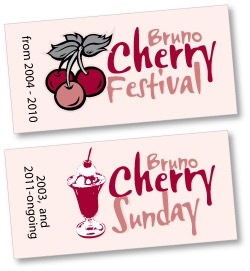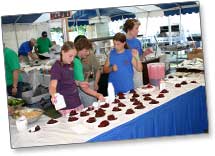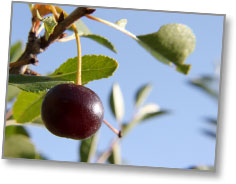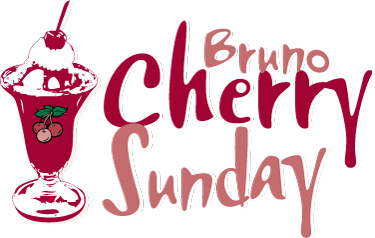History of the Bruno Cherry Sunday / Cherry Festival
The Bruno Cherry Sunday began in 2003 as a casual afternoon event with about 400 in attendance at the historic former St. Ursula's Academy and Convert in Bruno.  Under the direction of the Carlton Trail Ag Society, the event grew over the years to a full-weekend event dubbed the Bruno Cherry Festival, featuring various local-and-beyond bands, all-day food service including a pancake breakfast and turkey supper, trade show, children's programme and more, with attendance peaking in 2009 at about 3,000 people.
Under the direction of the Carlton Trail Ag Society, the event grew over the years to a full-weekend event dubbed the Bruno Cherry Festival, featuring various local-and-beyond bands, all-day food service including a pancake breakfast and turkey supper, trade show, children's programme and more, with attendance peaking in 2009 at about 3,000 people.
In 2011, organizers decided to bring the event back closer to its roots and reintroduced the festival as the original one-afternoon Bruno Cherry Sunday, featuring local talent, cherry sundaes and speakers.
In 2012, St. Therese Institute of Faith and Mission (who since 2007 has owned the facility where the festival is held) assumed the role of organizer and added back the pancake breakfast, morning and children's events, plus the opportunity to ‘u-pick’ the delicious sour cherries in the very orchards for which the festival was founded. Event organization transitioned to a newly-formed Bruno Cherry Sunday Committee in 2016.
The event has run nearly every year since its inception in 2003, with just two exceptions: The Committee was forced to cancel the 2018 event after their summer staff employment grant, which had been received annually for the previous 15 years, was denied. The global COVID-19 pandemic forced the cancellation of the event a second time in 2020.
One of the main attributes of the festival has been the location; the beautiful historic grounds of the former Ursuline Convent in Bruno. The convent building, built in 1919 and then added on to over the decades, started operating as a catholic girls boarding school in 1922, graduating its last class in 1982. The convent continued to be the motherhouse of the Ursulines of Bruno order until 1999, when the University of Saskatchewan agreed to a five-year lease of the buildings and property. It became known as the Bruno Ursuline Campus.
Dr. Bob Bors and others from the horticulture department at the University felt the grounds would be suitable for a demonstration orchard, particularly the dwarf sour cherry, and planted the first trees in Bruno in 2003, the same year as the first Bruno Cherry Sunday. Dr. Bors and Rick Sawatzky, fruit breeders at the University of Saskatchewan, developed these hardy cherries specifically for Saskatchewan’s harsh growing conditions. ‘SK Carmine Jewel’ was the first of the University’s cherries released in 1999; Five other cultivars were released in subsequent years: ‘Crimson Passion,’ ‘Romeo,’ ‘Juliet,’ ‘Cupid,’ and ‘Valentine.’ (Please see https://research-groups.usask.ca/fruit/Fruit%20crops/sour-cherries.php for more information about the cherries and their development).
 The success of the first Cherry Sunday provided the inspiration for the community to make the festival an annual event and The Carlton Trail Agricultural Society was formed. One of the goals of the Ag. Society, in organizing the festival, was to promote and celebrate the new sour cherry varieties. The festival also provided opportunities for commercial producers and backyard growers to highlight their products. With a $15,000 grant from the Saskatchewan Association of Agricultural Societies and Exhibitors, planning for the 2004 Bruno Cherry Festival shifted into high gear.
The success of the first Cherry Sunday provided the inspiration for the community to make the festival an annual event and The Carlton Trail Agricultural Society was formed. One of the goals of the Ag. Society, in organizing the festival, was to promote and celebrate the new sour cherry varieties. The festival also provided opportunities for commercial producers and backyard growers to highlight their products. With a $15,000 grant from the Saskatchewan Association of Agricultural Societies and Exhibitors, planning for the 2004 Bruno Cherry Festival shifted into high gear.
Meanwhile, the University ended their lease agreement. This forced the Sisters to make a decision – demolish the 60,000 square foot facility or continue to operate it as an Event Centre.  Under the leadership of Sister Maureen Maier, the Ursuline Sisters continued to operate the facility as the Prairie Ursuline Centre. During this time an additional 11,000 sour cherry trees were planted on a portion of the 65 acres of land on the Ursuline grounds. In 2007, the property was sold to another Catholic group who founded St. Therese Institute of Faith and Mission in the facility. This was a good fit for the Sisters as it furthered their legacy of faith formation by passing the property on to a group that held similar religious and philosophical beliefs. It kept the property viable as an important physical and economic landmark in the community of Bruno.
Under the leadership of Sister Maureen Maier, the Ursuline Sisters continued to operate the facility as the Prairie Ursuline Centre. During this time an additional 11,000 sour cherry trees were planted on a portion of the 65 acres of land on the Ursuline grounds. In 2007, the property was sold to another Catholic group who founded St. Therese Institute of Faith and Mission in the facility. This was a good fit for the Sisters as it furthered their legacy of faith formation by passing the property on to a group that held similar religious and philosophical beliefs. It kept the property viable as an important physical and economic landmark in the community of Bruno.
- Details
- Category: General Info
- Published: Tuesday, 05 July 2016 11:22
- Written by Bruno Cherry Sunday
- Hits: 17577


